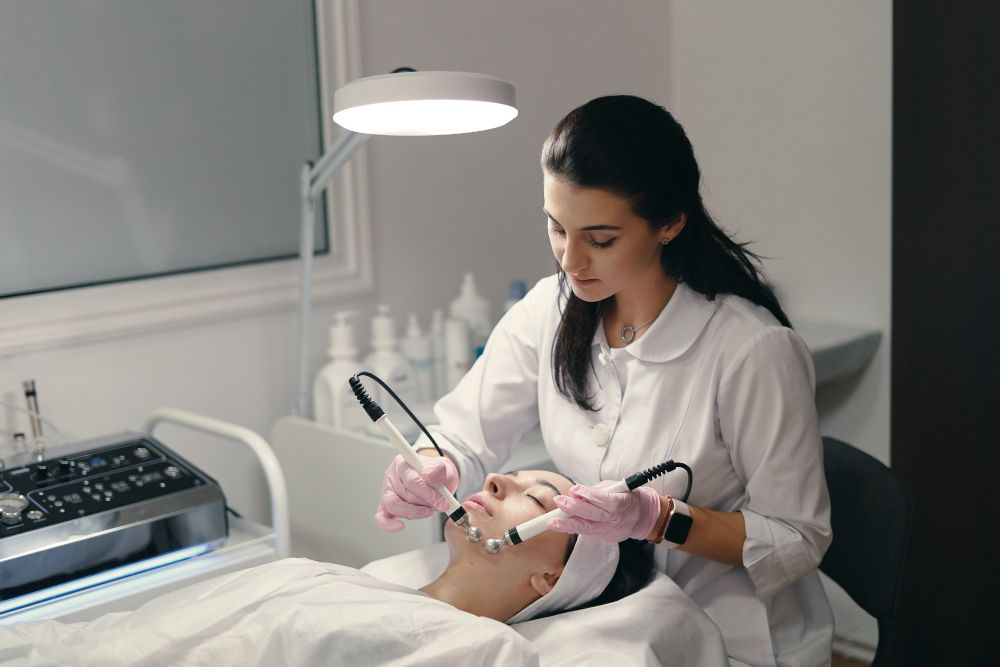Dermatology Hospitals in Hyderabad for Skin Treatment, Hair Loss
Highly qualified and experienced dermatologists, cosmetologist, skin specialist, skin doctor at PACE Hospitals have vast experience and expertise in handing wide range of medical and surgical treatments for various skin diseases through latest & advanced modalities.
Department of Dermatology is equipped with state-of-the-art and cutting edge facilities, along with the backing of the top dermatologist in Hyderabad to cater latest medical and surgical skin treatment aiming to deliver utmost priority focused on patient comfort and satisfaction to achieve and maintain healthy, youthful-looking skin.
Why choose PACE Hospitals?
Comprehensive Hair & Skincare Treatment
Providing treatment to a wide range of cosmetic, hair and skin related diseases.
Advanced State-of-the-art Facility
Equipped with advanced latest diagnostic equipment, treatment facilities for skin and hair treatment.
Skilled & Experienced Dermatologist
Team of experienced dermatologist, cosmetologist and Skin Specialist with vast experience.
Advanced Centre for Skin and Hair Loss Treatment in Hyderabad, Telangana
PACE Hospitals is one of the Best Dermatology Hospitals in Hyderabad, catering skincare and cosmetic procedures, such as chemical peels, laser hair removal, and latest modalities to offers wide range of skincare treatment and excellent patient care.
The skin care doctor at PACE Hospitals is skilled in handling severe cases of skin and hair loss problems in adults and pediatrics with high success rate. The team of best dermatologist / skin specialist and cosmetologist in Hyderabad, Telangana; are well versed in handling wide range of dermatology diseases treatment, such as:
- Psoriasis, Dermatitis, Eczema, Melasma
- Leprosy, Vitiligo, Folliculitis
- Warts, Pigmentation, Ringworm
- Skin lightening, Skin allergy, Hair loss
- Pediatric dermatoses, and more
3,12,338
98,538
684
2011
Need Help?
A new or changing mole, A persistent rash or skin irritation, Unexplained hair loss, changes in the texture or colour of your skin, Warts or other growths on your skin, Pain or burning on your skin, Itching or scaling of your skin. If you are experiencing any of these symptoms, it is important to see a dermatologist as soon as possible. Early diagnosis and treatment of skin conditions is important to prevent complications and improve your quality of life.
What we treat?
We offer a treatment for a comprehensive and compassionate dermatology care for patients suffering from skin related diseases.

Diagnostic Tests and Procedures Performed
We perform a wide range of procedures to treat wide variety of skin diseases and conditions.

Chemical peels:
It is also called chemexfoliation or chemical exfoliation, is a type of cosmetic procedure in dermatology in which a chemical substance is applied to the skin to induce the controlled destruction of the top layer of the skin (epidermis), along with or without some of the dermis, resulting in the regeneration and remodelling of the skin.
In combination with other procedures like laser or dermabrasion (a skin-resurfacing procedure used to remove the outer layer of the skin), dermatologists and cosmetic surgeons use the chemical peels' technique to improve the appearance of the skin. Based on how deeply they penetrate the skin layers, the chemical peels are classified into deep, medium and superficial.
Factors that affect the efficacy of the chemical peeling procedure:
- Patient's skin sensitivity
- Application techniques used by dermatologists or cosmetologists
- Concentration and pH of chemical reagents used
Indications of chemical peels
Chemical peels are a popular method of skin resurfacing, and they can be used for various reasons.
- Rejuvenating the face to address age-associated skin problems, such as wrinkles or rhytides and enlarged pores.
- To manage inflammatory disorders such as pseudofolliculitis barbae, acne vulgaris, post-acne scarring and rosacea.
- To cure pigmentary disorders such as ephelides (tan marks on the skin, also known as freckles), melasma (dark spots and patches on the face), lentigines (increased pigmentation induce flat spots), and post-inflammatory pigmentation.
- To treat epidermal proliferation and precancerous lesions, including sebaceous and actinic keratosis.
Contraindications of chemical peels include
- Patients who have a previous incidence of allergic reactions to the chemical reagents used in the peeling procedure.
- Presence of wounds at the procedural area of the peel.
- Usage of medications such as retinoids in the last six months
- Pregnant and lactating women
- Patients who had recent facial surgery, undergone radiation therapy and the presence of skin diseases such as atopic dermatitis, connective tissue diseases, and psoriasis. [PH1]
PRP therapy for hair loss:
Platelet-rich plasma (PRP) Injections are becoming increasingly common to treat hair loss problems. Platelet-rich plasma is a composition of plasma (the liquid component of blood) and platelets, a type of blood cell with a significant function in the healing process. This process includes collecting and centrifuging the patient's blood, separating other components of the blood from platelets, and concentrating them with plasma.
Platelet-rich plasma (PRP) is rich in over 20 different growth factors, including transforming growth factor (TGF-1) platelet-derived growth factor (PDGF), and vascular endothelial growth factor (VEGF). These factors help in wound healing by modulating cell migration, proliferation, extracellular matrix (ECM) remodelling, and angiogenesis (new blood cell formation).
Both the prevention of further hair loss and the stimulation of new hair growth can be achieved with PRP therapy to treat male pattern baldness. Furthermore, PRP therapy can promote hair growth after a hair transplant.
Contraindications:
A PRP procedure is a low-risk procedure and does not usually cause major side effects. However, this therapy is not suitable for everyone. PRP therapy is contraindicated in patients with
- Platelet dysfunction (abnormal platelet functions)
- Thrombocytopenia (decrease in blood platelets)
- Abnormal blood pressure
- Septicaemia (blood infection)
- Infection in the treating area
Electrocautery in dermal diseases:
Electrocautery is also known as thermal cautery, where a dermatologist passes a direct current to a metal electrode (with a needle-like tip) that resists electrical energy flow and produces heat. Under local topical anaesthetics, the dermatologist numbs the operated area. The heat thus produced by an electrode is applied to the living tissue by placing the needle near or on the tissue to achieve haemostasis (stoppage of bleeding from a blood vessel), thereby destroying abnormal tissue.
Electrocautery treats various skin conditions such as seborrheic keratosis, actinic keratosis, angiomas, warts, skin tags, dermatosis papulosa nigra, etc. Electrocautery has few risks and complications, such as minor bleeding, infection, and pain.
Why to choose PACE Hospitals?
- A Multi-Super Speciality Hospital.
- NABH, NABL, NBE & NABH - Nursing Excellence accreditation.
- State-of-the-art Liver and Kidney transplant centre.
- Empanelled with all TPAs for smooth cashless benefits.
- Centralized HIMS (Hospital Information System).
- Computerized health records available via website.
- Minimum waiting time for Inpatient and Outpatient.
- Round-the-clock guidance from highly qualified super specialist doctors, surgeons and physicians.
- Standardization of ethical medical care.
- 24X7 Outpatient & Inpatient Pharmacy Services.
- State-of-the-art operation theaters.
- Intensive Care Units (Surgical and Medical) with ISO-9001 accreditation.

